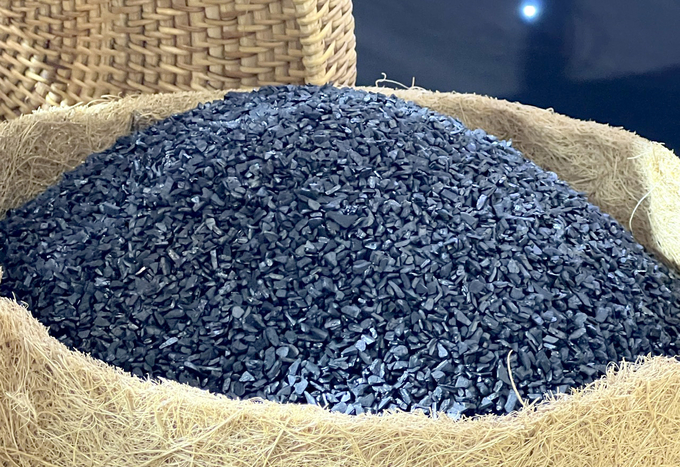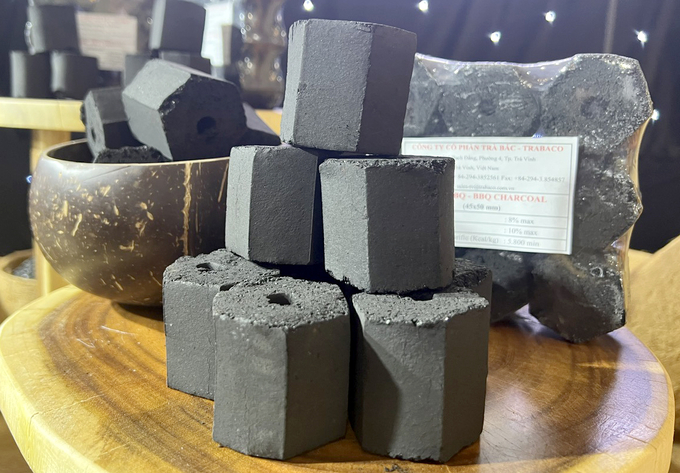May 17, 2025 | 02:20 GMT +7
May 17, 2025 | 02:20 GMT +7
Hotline: 0913.378.918
May 17, 2025 | 02:20 GMT +7
Hotline: 0913.378.918

Activated carbon from Trabaco's coconut shell charcoal. Photo: Son Trang.
At the International Conference on the Coconut Industry (CocoNext 2024) in Ben Tre, a variety of Vietnamese coconut products, including coconut milk and coconut oil, were on display, garnering the attention of both local and international delegates. Trabaco Company's products, which include coir and shells, garnered significant interest among these. These products consist of coconut fiber mats, coconut fibers, pure BBQ charcoal from coconut shell charcoal, and activated carbon from coconut shell charcoal.
Trabaco is acknowledged as one of the foremost enterprises in the production of valuable products from coconut shells and coir, which were previously regarded as byproducts. Trabaco has concentrated on the production of activated carbon from coconut hulls since 1997. Currently, the organization maintains five facilities that are capable of annually producing 7,000 tons of activated carbon from coconut shells. It is also capable of producing pure BBQ charcoal from coconut shells at a rate of 1,800 tons per year, baled coconut fiber at 16,000 tons per year, and knitted coconut fiber carpets that cover 1.5 million square meters annually.
Trabaco is a prominent manufacturer of activated carbon products derived from coconut shells with respect to Vietnam and the global market. The company exports coconut shell-activated carbon to more than 30 countries and territories, including the United States, Canada, the United Kingdom, France, Germany, the Netherlands, Japan, South Korea, China, and Australia. Water filtration, air purification, and gold recovery are among the numerous industries that use these products.
As a product derived from coconut byproducts, coconut charcoal has become one of the key trade commodities in the global coconut industry, with an increasing export value.

BBQ charcoal from coconut shell charcoal. Photo: Son Trang.
Nuwan Chinthaka, Vice President of the International Coconut Community, estimates that the global export value of coconut shell charcoal is approximately USD 1.09 billion, placing it fifth in terms of value, following coconut water, coconut oil, shisha charcoal, and coir products.
The export value of coconut charcoal in Vietnam was USD 88.5 million in 2023, with activated carbon from coconut shells accounting for approximately USD 33 million.
Chinthaka stressed that shisha charcoal has the potential to generate nearly USD 100 million in revenue for Vietnam's coconut exports. Among coconut products, shisha charcoal is the third most valuable export at USD 5.05 billion on a global scale, following coconut oil and coconut water.
Vietnamese businesses should prioritize the production and export of shisha charcoal, a product that is in high demand globally and is being used more frequently in restaurants and households, in addition to coconut charcoal and activated carbon from coconut shells, suggests international experts.
The utilization of coconut hulls and shells to produce coconut charcoal, activated carbon, and shisha charcoal is a sustainable bioenergy approach that promotes a circular economy within the coconut industry. This considerably improves the livelihoods of coconut farmers in numerous countries, including Vietnam, and increases the economic value of coconut trees.
Nevertheless, provinces with the potential to cultivate coconuts must establish designated coconut material zones in order to increase the production and export of coconut products, particularly those that are derived from residues. The current supply of coconuts in the Mekong Delta is dispersed across multiple provinces and cities, which presents a challenge for enterprises involved in the collection, according to Huynh Khac Nhu CEO of Trabaco. In order to obtain raw materials for the production of activated carbon and other products, the company has occasionally been required to import coconuts from Indonesia.
Translated by Linh Linh
![Multi-channel, multi-directional Vietnamese agricultural markets: [7] Deep processing makes global reach easy](https://t.ex-cdn.com/nongnghiepmoitruong.vn/608w/files/huytd/2025/05/16/2946-che-bien-sau-chia-khoa-vang-nang-tam-nong-san-viet-tren-ban-do-the-gioi-080603_110-093858.jpg)
(VAN) The application of deep processing technology is helping Vietnamese agricultural products enhance their value, create competitive advantages, and open doors to conquer global consumers.
![Multi-channel, multi-directional Vietnamese agricultural markets: [6] Agri products go online](https://t.ex-cdn.com/nongnghiepmoitruong.vn/608w/files/content/2024/12/10/1-113313_954.jpg)
(VAN) Bringing agri products onto e-commerce platforms is an effective way to build a brand that many businesses, cooperatives, and agricultural production households are doing.

(VAN) Veterinary training should focus on quality, not just quantity. Veterinarians also need more options to pursue specialized training.

(VAN) The veterinary industry needs to be viewed objectively and further invested in to properly demonstrate its role and importance in the new context.

(VAN) The number of veterinarians graduating each year is not enough to meet actual needs, hence a difficult problem for the growing livestock industry.

(VAN) The strategic partnership between Cambodia, the Philippines, Vietnam, and CGIAR ensures that innovative solutions effectively address national priorities for food system development.

(VAN) This was affirmed by the UK Minister of State at the Department for Environment, Food and Rural Affairs during a working session with Deputy Minister Tran Thanh Nam on May 13.